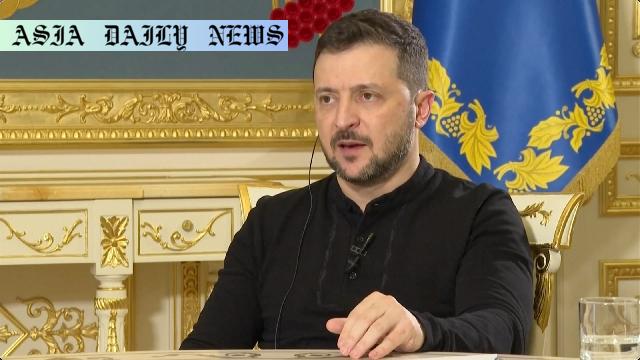Crimea remains a critical focus as President Zelenskyy stresses Ukraine’s rightful claim, asserting weapons are insufficient for forceful reclamation.
- Zelenskyy emphasizes Ukraine’s constitutional and legal claim to Crimea.
- Critiques U.S. peace plan for bias favoring Russia.
- Focus shifts to diplomacy and sanctions amid limited force options.

Zelenskyy Acknowledges Insufficient Militarized Options for Crimea
The ongoing conflict between Ukraine and Russia remains at the forefront of international discourse, highlighting both militarized tensions and the delicate intricacies of global diplomacy. Ukrainian President Volodymyr Zelenskyy has addressed the grim reality that Ukraine currently lacks the necessary weaponry to retake Crimea by force. Crimea, which Moscow annexed in 2014, remains a contentious geopolitical issue, with Kyiv steadfast in its constitutional stance that the territory rightly belongs to Ukraine.
In a press briefing, Zelenskyy concurred with U.S. President Donald Trump’s assessment of the situation, while also emphasizing the unyielding commitment Ukraine holds toward reclaiming its occupied territories. This revelation comes amidst continued violence, underscored by a recent missile attack in the Ukrainian capital of Kyiv that claimed 12 lives. Zelenskyy visited the site alongside ambassadors from allied nations, underlining unity and mourning the lives lost in ongoing aggression.
Reflecting on the limitations of relying solely on militarized strategies, Zelenskyy advocated for the implementation of non-militarized measures such as sanctions and diplomatic escalations to instigate discussions on Crimea’s future. However, he reaffirmed that any constructive negotiations would require a comprehensive, unconditional ceasefire as a prerequisite. This balanced approach surfaces as Ukraine faces growing pressures and propositions from international players, including a Trump administration-proposed peace strategy. Predictably, these plans, which involve potential U.S. recognition of Russia’s annexation of Crimea, face widespread backlash for perceived biases towards Moscow’s interests.
Crimea’s International Legal Status and Implications
Zelenskyy’s reaffirmation of Crimea as “temporarily occupied” shines a spotlight on the core of Ukraine’s argument—its territorial sanctity backed by international law and Ukraine’s national constitution. The annexation, seen as illegal by a significant portion of the international community, remains a flashpoint for Ukraine’s relations with Russia and other global stakeholders. By elevating the stance that Crimea’s occupation undermines global norms, Zelenskyy seeks to solidify support among Western allies, particularly in challenging Russia’s policies and actions.
Securing Crimea’s return under Ukrainian sovereignty, however, is far from a straightforward task. Zelenskyy’s balanced approach—combining diplomatic dialogue, sanctions, and acknowledging the current operational limitations of the Ukrainian military—reflects a nuanced strategy. The careful stance considers both internal political stability and the necessity for continued western financial and military assistance. Opinions across global audiences remain divided as to whether diplomacy alone can undo Moscow’s entrenched claim over the peninsula.
Global Criticism of the U.S.’ Crimean Peace Plan
The Trump administration’s proposed peace initiative, which allegedly entertains U.S. recognition of Russia’s annexation of Crimea as part of a broader settlement, has garnered sharp criticism. Critics highlight its inherent bias toward Russia, which could set precarious precedents for future geopolitical conflicts. For Ukraine, conceding Crimea under international endorsement would dismantle years of principled stances and galvanize pro-Moscow factions seeking territorial expansion under a weakened global order.
The mixed reception of these strategies and their longer-term implications on global stability remain important facets for policymakers worldwide. Moreover, the concerns are not limited to Crimea; the proposal also risks diluting efforts for Ukrainian sovereignty across broader territories occupied by Russian forces. Any deviation from impartial mediatory roles by superpowers like the United States risks alienating satellite allies like Ukraine while emboldening aggressors.
Concluding Thoughts on Diplomacy and Ceasefire Precedents
Zelenskyy’s call for prioritizing diplomatic and economic countermeasures aligns with his broader vision of garnering international pressure to isolate Russia politically and economically. Sanctions, alongside efforts to sever key trade routes and financial channels, aim at forcing Russia to the negotiation table while ensuring that Ukraine retains a consolidated political and military footing with external allies. Yet, diplomatic successes are predicated on the establishment of trust, cessation of hostilities, and reconsideration of unilateral decision-making from influential actors globally.
Ultimately, while Crimea remains integral to Ukrainian sovereignty, the reality remains that its reclamation—militarized or otherwise—is not an isolated act of statecraft. It necessitates support, cooperation, and mutual respect across multilateral platforms committed to addressing aggression, sovereignty breaches, and nuclear risk mitigations. As this intricate web continues to unfold, the stakes for both regional stability and broader international norms mount steadily.



Commentary
Crimea’s Future Hinges on Strategy and Global Cooperation
The ongoing discourse surrounding Crimea highlights complex intersections between sovereignty, military limitations, global law, and diplomatic avenues. Ukraine’s path forward demonstrates a nation grappling not only with resolute opposition to a major military power in Russia but also navigating the nuances of international support laden with competing agendas.
Zelenskyy’s admission regarding Ukraine’s inadequate military means is as much a strategic reality as it is a soft plea for continued international assistance. Relinquishing Crimea through outright military conquest risks exacerbating loss and devastation among all parties. However, this acknowledgment also brings forward pragmatic opportunities for economic pressures, sanctions, and shifting political partnerships to underscore Ukraine’s legitimate moral arguments.
On the geopolitical front, the Trump administration’s peace proposal is indeed a controversial addition to this narrative. While peace is a desired outcome, the dynamics of rubber-stamping Russian annexation undermines both ethical considerations and the authoritative structures of international law. If such precedents take root, they risk destabilizing smaller states globally, emboldening powerful nations to push aggressive agendas with impunity, aware of potential acquiescence by leading mediatory forces on the global stage.
Therefore, it is imperative that Ukraine’s allies proceed with measured, unbiased approaches to fuel diplomatic integrity rather than compromise. In a world increasingly marked by polarizing ideologies, the Crimea question invokes all facets of governance spanning collective enforcement, sovereign dignity, and ensuring stability through building regional consensus amidst global challenges.